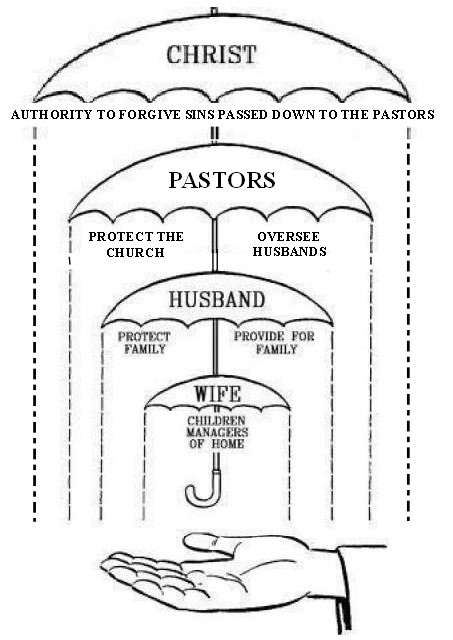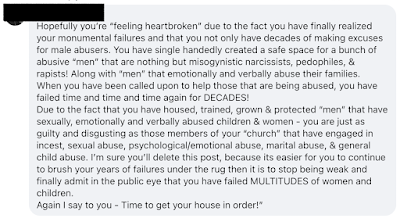RP pastors have no qualms about working through Galatians. They see the message of Galatians as kind of a Hebrews-like "NT covenant is better than OT covenant". That is definitely a significant part of the message, but there is more that might not be so comfortable to RPs.
Post RP learning 1: Corinthians and Galatians are essentially the book-ends of the churches. (aside) I highly recommend listening to something like "Immerse: Messiah" - it's simply the Bible read as it might have been at the time, without chapters and verses. I also appreciate The Message translation of the Bible because it is a more grace-focused and readable version - although I typically use NASB for debate purposes as it tends to be more literal. (end aside)
So, Corinthians is the picture of today's liberal church - they are within the bounds of what Paul considers Christianity, but they are focused on celebrating diversity, so much so that they wind up celebrating, I suppose, God's graciousness to a man living an obviously sinful lifestyle. That is too much for Paul and he condemns the church for that, but he also recommends some amount of order in the chaos.
Galatians is, in a sense, the other bookend, but keep in mind that Paul uses strong words and says that what the Judaizers are bringing in is a different gospel - outside the bounds of Christianity. In fact, Paul accuses Peter, who had simply started pulling away from the uncircumcised Gentiles, of forsaking the gospel.
But when I saw that they were not straightforward about the truth of the gospel, I said to Cephas in the presence of all, “If you, being a Jew, live like the Gentiles and not like the Jews, how is it that you compel the Gentiles to live like Jews? (Gal. 2:14)
So, the Corinthian church is a church that is so invested in "Grace" that they are willing to forsake truth, and the Galatian church is a church so invested in "Truth" that they are willing to forsake grace. However, keep in mind that both Grace and Truth in the sense of these churches are a false caricature, as the reality should not be in opposition. Just like the Pharisees and Sadducees, the church continues to gravitate towards one of these two positions, but unlike them, Paul condemns the Galatian church of straying from the gospel.
Post RP learning 2: The tollbooth and the path. Recently, I heard a good perspective on grace and truth that got me thinking about how legalism kills the gospel. We as Christians are to follow the narrow path, okay, but the narrow path is protected by a tollbooth, and the fare is too expensive for us to pay. So, first, we need grace because we are not even worthy to walk the narrow path (Total Depravity), but then, we need to be yoked to Jesus because he is the only one who can lead us along the narrow path.
The problem with legalism is that we are too focused on the tollbooth. Once the debt is paid, yes, we can be thankful that it is paid, but the tendency of legalism is to try and prove that we were worth saving because we're better than the unsaved. I think RP sermons/worm theology could come from a good desire to be thankful, but I think while RPs wallow in their worminess, Jesus is holding the yoke and saying, "Come join me on what's next". RPCNA doctrine is so focused on the tollbooth that once we're saved, there's nothing left to talk about, maybe other than RP distinctives and being better than all the other churches.
**EDIT**
To add to this, there is not a lot of discipleship in the RP church. Once a soul is won, it's pretty much, come listen to sermons and come to conferences. Under one pastor, I did attend a men's "discipleship" class, but in true legalistic fashion, each week was: First, point to all our inadequacies in some area of discipleship, let's say reading the Bible; Second, present a relatively unattainable standard for what our proper level of commitment to that area should be; and Third, challenge us to meet the unattainable standard going forward. So, after the series is complete, we're supposed to be spending an hour a day reading the Bible, an hour a day praying, an hour a day meditating, one day a week fasting, and probably an hour a day discipling others to do the same. Maybe these books are appealing to pastors because it seems like a bare minimum to them, not the excruciating burden it seems for others.
There is definitely a need for a regular rhythm of practicing these disciplines, but I think the focus on "hours spent" is more checking some sort of box rather than how do I develop my relationship with God through daily devotions.
Post RP learning 3: The RP church is the Galatian church. RP pastors like to focus on the "issue" at Galatia being a rejection of the new covenant for the old, and that is the case for that church, but I don't think the point of that letter being in scripture is merely about people wanting to be circumcised and follow the OT law. Here are some hints to the broader purpose:
Because you are sons, God has sent the Spirit of His Son into our hearts, crying out, “Abba! Father!” Therefore you are no longer a slave, but a son; and if a son, then an heir through God. (Gal 4:6-7)They eagerly seek you, not in a commendable way, but they want to shut you out so that you will seek them. (Gal 4:17)
[and for reference] So a young man ran and informed Moses, and said, “Eldad and Medad are prophesying in the camp.” Then Joshua the son of Nun, the personal servant of Moses from his youth, responded and said, “My lord Moses, restrain them!” But Moses said to him, “Are you jealous for my sake? If only all the Lord’s people were prophets, that the Lord would put His Spirit upon them!” (Num 11:27-29)
The Galatians passage and the Numbers passage are the same pattern. God enables freedom through the Holy Spirit and those who want to maintain control and honor try to squelch the freedom and thus the work of the Spirit. We see both sides. Moses recognizes the pride/control issue immediately and, I believe prophetically, looks forward to the new covenant promise of the Holy Spirit being poured out. In Galatians, the Spirit has been poured out and the Judaizers are trying to re-establish control by squelching the work of the Spirit.
Sorry to say, but that is exactly what is happening in the RP church. Instead of following Moses's are you jealous for my sake? the elders and pastors want to shut members out of the freedom of the new covenant so that they will be sought. The shutting out and the seeking are both woven into the fabric of the RPCNA. The further away I get from the cognitive dissonance fog in the RPCNA, the more clearly I see that there is little to no hope of reform.
I've talked about this earlier, but it is still applicable:
But woe to you, scribes and Pharisees, hypocrites, because you shut the kingdom of heaven in front of people; for you do not enter it yourselves, nor do you allow those who are entering to go in. (Matt 23:13)
Post-commentary:
As a former lifelong RP, I've worked through the grief of walking away from the relationships, the fun conferences and especially the beauty of singing God's word a capella. I appreciate that it is an insurmountable barrier for acquaintances and friends who have knowingly chosen a life of being shut out over the heartbreak of walking away.
I also recognize that not every pastor and elder in the RPCNA is a neo-Judaizer, but those who aren't, in my opinion, are the voices in the desert. Maybe not even voices in the desert because they are well aware of the RP idols and have chosen to gently push people away from the idols rather than attempt to chop them down or speak against them. Far more have so intertwined being RP with a quest for power and admiration that the gospel has become slavery to an institution, not freedom in Christ. My reading of the tea leaves - who is training the next generation of pastors, what issues come to Synod and what is the outcome, who are the powerful voices in the courts - is that the RPCNA is on the wrong trajectory. That said, as time goes on, I'm less connected and less interested in what the RPCNA is doing, so unless I get a comment or an e-mail or have a conversation that gets me interested in something, I don't obsess about what is happening in RP-land.
Probably the best litmus test for neo-Judaizer vs. voice in the desert is whether this verse needs an extra comma at the [?].
for the equipping of the saints[?] for the work of ministry, for the building up of the body of Christ (Eph 4:12)
The neo-Judaizers have so claimed the seeking for themselves and the shutting out for the laity, that only professionals can minister, while the laity observe, a rejection of the priesthood of all believers.





